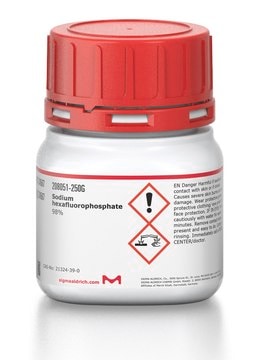414220
Propylene carbonate
suitable for HPLC, 99.7%
Synonym(s):
1,2-Propanediol cyclic carbonate, 4-Methyl-1,3-dioxolan-2-one
About This Item
Recommended Products
vapor pressure
0.13 mmHg ( 20 °C)
0.98 mmHg ( 50 °C)
Quality Level
Assay
99.7%
form
liquid
autoignition temp.
851 °F
expl. lim.
14.3 %
technique(s)
HPLC: suitable
impurities
<0.020% water
evapn. residue
<0.0005%
refractive index
n20/D 1.421 (lit.)
pH
7 (20 °C, 200 g/L)
bp
240 °C (lit.)
mp
−55 °C (lit.)
density
1.204 g/mL at 25 °C (lit.)
λ
H2O reference
UV absorption
λ: 235 nm Amax: 1.00
λ: 280 nm Amax: 0.50
λ: 300 nm Amax: 0.30
λ: 350 nm Amax: 0.05
λ: 375-400 nm Amax: 0.01
application(s)
food and beverages
SMILES string
CC1COC(=O)O1
InChI
1S/C4H6O3/c1-3-2-6-4(5)7-3/h3H,2H2,1H3
InChI key
RUOJZAUFBMNUDX-UHFFFAOYSA-N
Looking for similar products? Visit Product Comparison Guide
General description
Application
Signal Word
Warning
Hazard Statements
Precautionary Statements
Hazard Classifications
Eye Irrit. 2
Storage Class Code
10 - Combustible liquids
WGK
WGK 1
Flash Point(F)
269.6 °F - closed cup
Flash Point(C)
132 °C - closed cup
Certificates of Analysis (COA)
Search for Certificates of Analysis (COA) by entering the products Lot/Batch Number. Lot and Batch Numbers can be found on a product’s label following the words ‘Lot’ or ‘Batch’.
Already Own This Product?
Find documentation for the products that you have recently purchased in the Document Library.
Customers Also Viewed
Articles
Solid-state lithium fast-ion conductors are crucial for safer, high-energy-density all-solid-state batteries, addressing conventional battery limitations.
Solid-state lithium fast-ion conductors are crucial for safer, high-energy-density all-solid-state batteries, addressing conventional battery limitations.
Solid-state lithium fast-ion conductors are crucial for safer, high-energy-density all-solid-state batteries, addressing conventional battery limitations.
Solid-state lithium fast-ion conductors are crucial for safer, high-energy-density all-solid-state batteries, addressing conventional battery limitations.
Our team of scientists has experience in all areas of research including Life Science, Material Science, Chemical Synthesis, Chromatography, Analytical and many others.
Contact Technical Service












